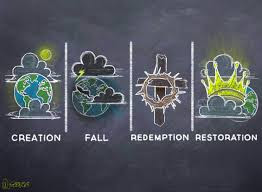A Holistic World-and-Life View: Conversations with Abraham Kuyper, C. S. Lewis, N. T. Wright and Paul
 |
| Used from http://www.ellensburgchristian.org/ |
While I also like bemoaning the prevalence of "Sunday-Christians," I sometimes fall prey to the compartmentalizing of my faith. Yearning to have a faith that integrates all of my being, and thus shaping my world-and-life-view, I have looked to several sources for inspiration. In BSF, we are studying the life of Jesus in the gospel of John and how he is eternal and is the source of life. Paul also sees this majestic preeminence of Jesus in Colossians (1:15-17) when he’s inspired to say:
He is the image of the
invisible God, the firstborn of all creation. For by him all things were
created, in heaven and on earth, visible and invisible, whether thrones or
dominions or rulers or authorities—all things were created through him and for
him. And he is before all things, and in him all things hold together.
In times where we have utterly
compartmentalized our faith from reason, from politics, from financial
stewardship, from family, from sexuality and many other relevant areas of our
lives, the need to integrate our faith with all of life is clear. It was C. S.
Lewis who famously said that,
There
is no neutral ground in the universe. Every square inch, every split second is
claimed by God, and counterclaimed by Satan.
Abraham Kuyper an 18th
century Dutch author, politician, theologian, cultural commentator and
university founder gave himself to this work of integration. Perhaps it is due
to his multi-perspective on life, given the long list of accolades. Written at
a time when the United States of America is bent on choosing their next
political leader after Martin Luther King Jr.’s dream of a black president came
to life in the face of Obama, this article
by The Gospel Coalition goes to show how Christians can be a part of the
renewal promised in Jesus throughout creation especially in the area of
politics.
Our view of how Christians can
be agents of cultural renewal is often warped due to our understanding of the
far-reaching consequences of salvation. Instead of the destination of faith
being disembodied souls flying around in a clear sky, the reality of heaven is
really that the Kingdom has come “down here.” Heaven has broken into earth as
much as even in the future there will be a new heavens and new earth. Both
realities are true. This means that somehow, together with all of creation, we
await the final restoration of ourselves and the entire cosmos (Romans 8).
Hence there is a sort of continuity between this present world and the next,
meaning that our lives here are of importance.[1] The task to integrate our
faith with all of life, remains a worthy endeavor and a biblical one, in the
scheme of eternity. On this point Abraham Kuyper, N. T. Wright, C. S. Lewis,
John and Paul have been instructive on the implications of the faith revealed
in the scriptures and its relevance to developing an overarching world-and-life
view.
The implication is that we
would be agents of renewal in each and every sphere of life. Where secularism
seeks to lay claim of life in the public square, the renewing work of God’s
Spirit provides a longer-lasting vision of human flourishing. The result is
relationships that are grace-filled and other-centered, political spheres that
nurture the well-being of citizens, citizens who view their work in a holistic
manner, artists and musicians whose paint strokes are inked with beauty,
goodness and truth.
[1]
N. T. Wright, Surprised by Hope: Rethinking Heaven, the Resurrection and the
Mission of the Church (HarperOne: New York, 2008), 26
Comments
Post a Comment